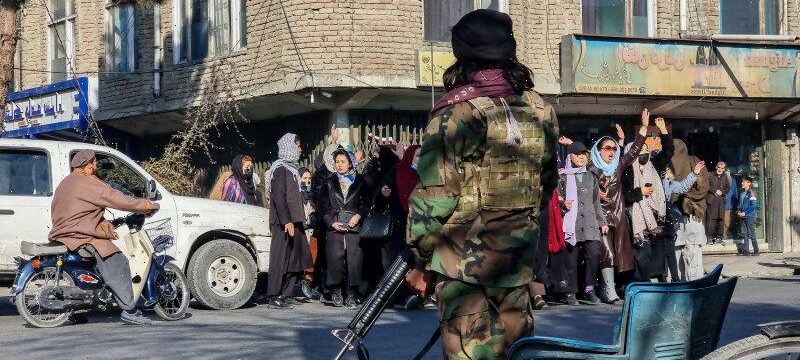Kabul: Afghanistan’s Taliban-run administration has ordered all local and foreign non-governmental organisations to stop female employees from coming to work, according to an economy ministry letter, in the latest crackdown on women’s freedoms.
The letter, confirmed by economy ministry spokesperson Abdulrahman Habib on Saturday (Kabul time), said the female employees were not allowed to work until further notice because some had not adhered to the administration’s interpretation of Islamic dress code for women.
Afghan women protest against a Taliban ban on women accessing universities earlier this month.Credit:Getty
It comes days after the Taliban-run administration ordered universities to close to women, prompting global condemnation and sparking some protests and heavy criticism inside Afghanistan.
Ramiz Alakbarov, the UN deputy special representative for Afghanistan and humanitarian coordinator, said he was “deeply concerned” by reports of the letter, which was a “clear breach of humanitarian principles”.
It was not immediately clear how the order would affect UN agencies, which have a large presence in Afghanistan delivering services amid the country’s humanitarian crisis.
The UN office for humanitarian affairs said the United Nations would try to meet with Taliban leadership to “obtain clarity on the reported order”.
The Charge D’Affaires for Norway, which funds aid in Afghanistan and hosted talks between Taliban and civil society members in January, condemned the move.
“The ban on female employees in NGOs must be reversed immediately,” Paul Klouman Bekken tweeted. “In addition to being a blow to women’s rights, this move will exacerbate the humanitarian crisis and hurt the most vulnerable Afghans.”
When asked whether the rules included UN agencies, Habib said the letter applied to organisations under Afghanistan’s coordinating body for humanitarian organisations, known as ACBAR. That body does not include the United Nations, but includes over 180 local and international NGOs.
However, the United Nations often contracts with NGOs registered in Afghanistan to carry out its humanitarian work.
Aid workers say female workers are critical to ensuring women can access aid.
Afghanistan’s already struggling economy has tipped into crisis since the Taliban took over in 2021, with the country facing sanctions and cuts in development aid.
Humanitarian aid, aimed at meeting urgent needs, has provided a lifeline to millions of people. Over half of Afghanistan’s population are reliant on humanitarian aid, according to the International Rescue Committee.
Reuters
Get a note directly from our foreign correspondents on what’s making headlines around the world. Sign up for the weekly What in the World newsletter here.
Most Viewed in World
From our partners
Source: Read Full Article

